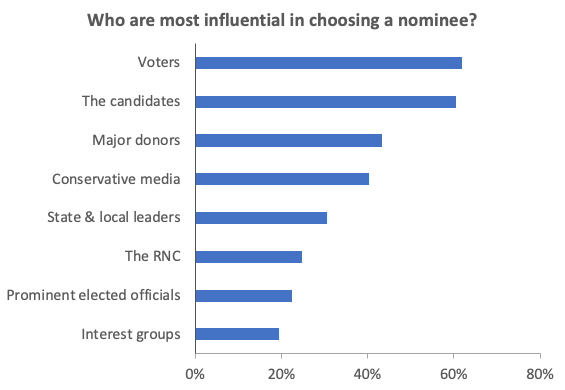This “invisible primary” period leading up to the caucuses and primaries of next year and then ultimately to the Republican convention next summer — it’s all about the party making a decision. So who actually makes it?
This is one of the questions I asked in my latest survey of Republican chairs. I wanted to know who they thought was most influential when it comes to the party picking a presidential nominee.1 I gave them a list of different political actors, and told them they could name as many as they wanted. The results are pretty interesting:
At the top of the list were voters and candidates. And yes, on some level, this makes perfect sense. Voters are ultimately the ones who will cast votes next winter and spring, and those votes determine who gets the most convention delegates and, thus, the nomination. And the candidates, through their skills as debaters and orators and fundraisers and glad-handers and everything else, are also obviously highly influential. Donors, media, party leaders, and others come far further down the list.
What’s also interesting is that this list is in almost the exact opposite order of what many political scientists (including me) would generally say. Quite a bit of research suggests that it’s party “insiders” — including donors and interest group leaders and prominent elected officials and others — who call the shots, with voters largely following the path laid out by these insiders months before.
This gets more interesting when we break the responses down by candidate support:
Keep reading with a 7-day free trial
Subscribe to Tusk to keep reading this post and get 7 days of free access to the full post archives.





